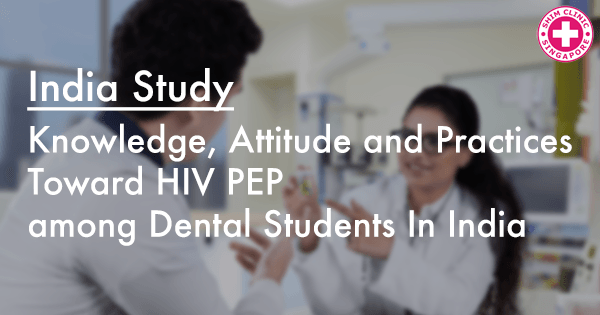Researchers recently conducted a study to find out whether dental students in India are aware of HIV post-exposure prophylaxis (PEP), a drug therapy commonly used to prevent HIV transmission after exposure especially among health care workers. The study published in the Annals of Medical and Health Sciences Research journal also sought to find out the students’ attitude and practices towards PEP.
India has a population of about 1.22 billion and is currently a country with the second highest population in the world. The country also has the third-largest number of people living with HIV. When healthcare workers get exposed to blood or fluids from human bodies, the chance of getting infected by HIV is small but the impact is great. HIV transmission happens 3 times out of every 3000 injuries from surgeries that involve the puncturing of skin using needles. This significant risk formed the basis of the study. The National AIDS Control Organization (NACO) in India created HIV PEP. Despite these clear guidelines, health care workers do not take enough measures after an exposure.
Dental Student Attitudes towards HIV Patients
The study was conducted among 128 dental students (64 interns and 64 PG students) at Rural Dental College of Pravara Institute of Medical Sciences (PIMS) Deemed University. Attitudes of the participants toward HIV patients were positive. The majority of the participants were aware that HIV is one of the riskier hazards a dentist can encounter in practice and were still willing to provide dental treatment to HIV patients if encountered in practice.
Knowledge on PEP
The participants were aware that HIV PEP therapy is a regime for high-risk occupational exposures with Post Graduate students showing better knowledge than the dental interns. However, both sets of participants did not about the optimal timing to start HIV PEP. Only about a quarter of each set of participants knew the correct duration of HIV PEP treatment. None of the interns and only 3.2% of Post Graduate students reported to have attended lectures, workshops or seminars about PEP in the past. This could be used to explain the lack of knowledge on the use of PEP among the students.
Even though the study suggested that majority of the participants were aware of the concept of HIV PEP, it also revealed that very few students knew the details like when to start PEP, which drugs to use and for how long to use PEP. The researchers thus recommended well-designed lectures, seminars and continuous dental education programs to be conducted to enrich the knowledge of dental students regarding HIV PEP.
Even though cases of HIV transmission through occupational exposure in dental practices are not many, such exposures should not be ignored because that can cause tremendous anxiety, fear and stress among exposed health care workers. It is important for dental health workers to take precaution because the HIV status of the majority of dental patients is unknown. Even when they make the first visit and they are aware, there is no requirement for them to disclose it to the dentist.
For more information about HIV testing and STD testing please call or visit our STD clinic!

